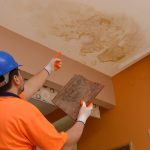Earthquake Damage: What It Can Do to Your Home?
Did you know that 42 out of 50 U.S. States have experienced earthquake damage in the last 50 years?
It’s true that most of these earthquakes affected the major earthquake states (Alaska, California, Hawaii, Nevada, Washington, Idaho, Wyoming, Montana, and Utah), it’s clear that nearly all states need to be aware of and prepared for this type of disaster.
Even when the earthquakes are considered “minor,” they can cause damage to structures, even if it goes unnoticed. In fact, these minor earthquakes can cause damage that seems negligible or isn’t noted at all, which is incredibly damaging. The weakening of structures over time can be caused and exacerbated by earthquakes, eventually leading to complete collapse.
What is an Earthquake?
As you may have learned in your elementary school science lessons, an earthquake is a movement between tectonic plates along a fault line. This movement causes friction that shakes the earth. Major earthquakes can create huge cracks in the earth, force earth upward into puckered hills, and shake structures to the ground. Earthquake magnitude is measured by the Richter Scale, which measures the amplitude of the seismic waves. The more severe the earthquake, the higher the Richter score. The devastating San Francisco Earthquake of 1906 was 8.25.
Earthquakes with a Richter scale score of 3-4 are the most common and usually do not result in any noticeable damage. However, every single earthquake releases a variety of seismic waves through the surface of the planet, which can affect structures of all types.
Types of Earthquake Damage
Seismic waves that ripple through the earth as the result of an earthquake can move the ground vertically and horizontally. As you can imagine, structures are generally not designed to withstand much movement. There are a variety of ways earthquakes can damage your home or other structures.
Mild Damage: The most minor of earthquakes will likely shake your possessions within the house, causing objects to fall from shelves or off walls. Occasionally windows may break, but the damage will be largely cosmetic.
Some Damage: For a more intense earthquake you will experience some damage in your home. This might include broken windows, distorted door frames or stuck doors, cracked concrete, fallen trees, and roof damage. This level of damage is deceptive because it may seem mild but often affects the foundations and structural integrity of homes (especially older homes) that can be dangerous in the future.
Significant Damage: In a strong earthquake, you’ll likely experience significant damage to your home. Cracked tile, extensive broken windows, crumbling bricks and exteriors, gas line leaks, flooding of water lines, collapsing roofs, buckling driveways, and more can be the resulting damage.
Extensive Damage: Major earthquakes can produce the type of damage you see in a catastrophe movie. Homes can be completely split or shaken to the ground entirely.
Get Earthquake Damage Protection with Hudson Douglas Public Adjusters, LLC
If you live in one of the 42 states that have experienced an earthquake in the last 50 years, particularly those listed earthquake states, you need to be prepared for an earthquake to affect your home or business. Hudson Douglas Public Adjusters is ready to help you manage your insurance claim so that you get a fair settlement value.
We’re licensed to offer services in Arizona, Utah, Colorado, Nevada, New Mexico, New Jersey, and Pennsylvania




